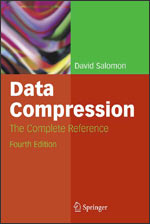 Title: Data Compression: The Complete Reference, Fourth Edition
Title: Data Compression: The Complete Reference, Fourth Edition| Link type | Link | Password |
|---|---|---|
| Book | http://rapidshare.com/files/85357029/08F08589-EC1D-467D-A0AC-DF7290BAC7A5.rar | www.freebookspot.com |
| Book | http://uploading.com/files/cf7f67e8/1846286026DataCompression.rar/ | |
| Strongly Recomended | http://www.filesonic.com/file/20112257/1846286026.rar | |
| Strongly Recomended | http://depositfiles.com/files/7ckfbhap5 | |
| Book | http://www.cash-file.com/qalbxjvy1nxw |